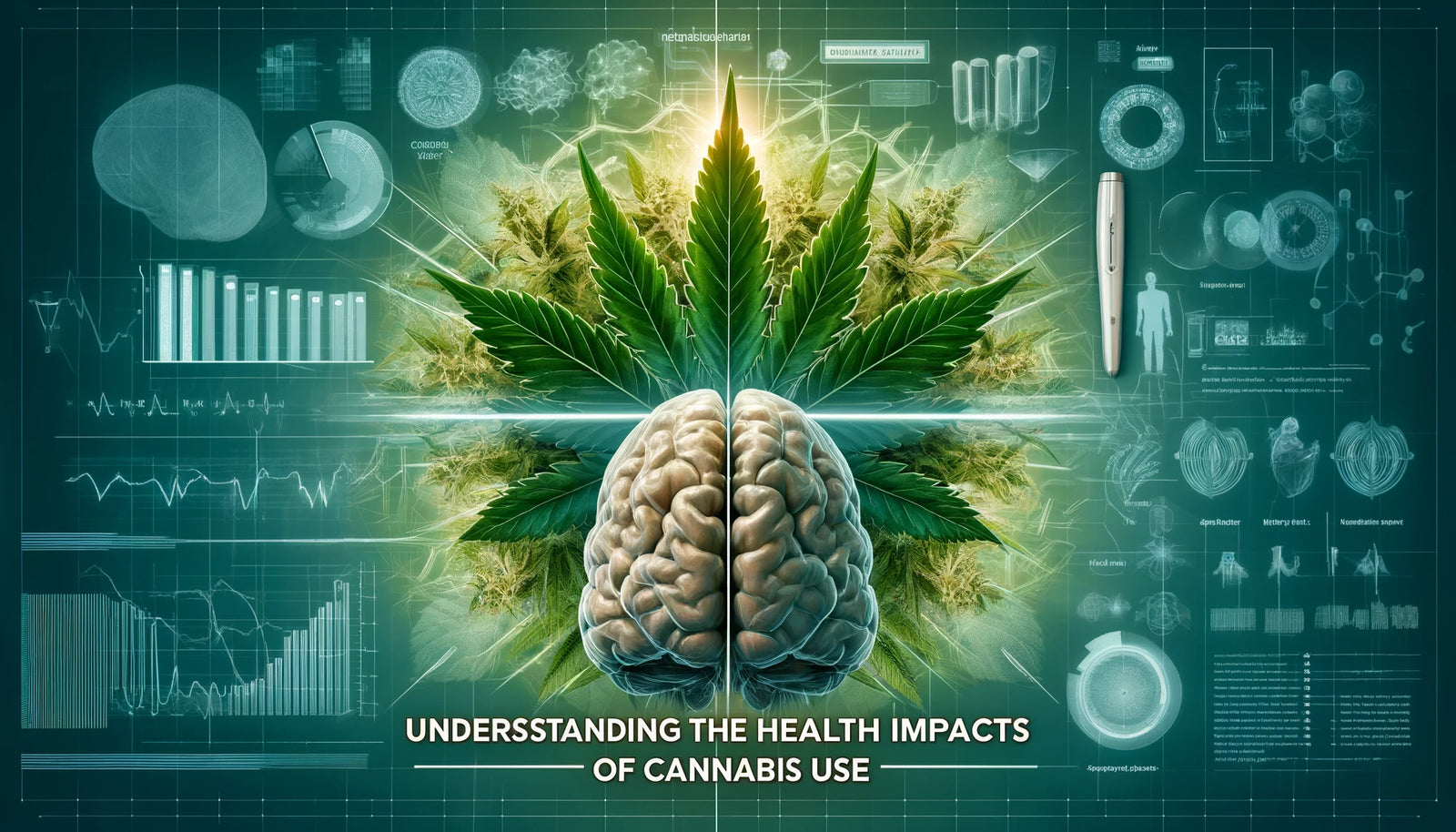Your Cart is Empty
Shop
Is Weed Addictive?
October 16, 2021 5 min read

Is Weed Addictive?
Health Risks
There are a variety of health problems associated with marijuana use, including heart and lung disease and mental disorders.
Regular smoking of marijuana can cause irritation to the lungs.
- Everyday cough and phlegm production
- Frequent acute chest illness
- Increased risk of developing lung infections
- Infected immune system
- It damages the central nervous system and kills brain cells
- Fertility issues
- An increase in heart rate and blood pressure
A study showed that those who smoke marijuana but don't smoke tobacco are more likely to have health problems and miss work more often than those who do not. This is mainly due primarily to their respiratory ailments. It is unknown if marijuana smoking increases the risk of developing lung cancer.
Studies also show that smoking marijuana can increase the heart rate by between 20 and 100 percent within minutes of starting to smoke. This effect can last for up to three hours. According to one study, marijuana users have a 4.8-fold increased risk of having a heart attack within the first hour. This risk is higher for those who are older and have cardiac problems.
Numerous studies have linked chronic marijuana use to mental illness. Some users may experience a temporary psychotic reaction when they consume high doses of marijuana. Schizophrenia patients may also be affected by the effects of marijuana. Studies that have been conducted over a long period of time show a connection between marijuana use and psychosis.
Other mental health issues, like:
- Depression
- Anxiety
- Personality disturbances
- Suicidal thoughts among adolescents
- Inability to find motivation to participate in rewarding activities
To better understand the mental health connections and their ramifications, more research is required.
Pregnancy marijuana use is linked to an increased risk of neurobehavioral issues in babies. THC and other chemicals mimic the body's endocannabinoid chemical, so marijuana use during pregnancy can cause brain damage in the baby. The child may experience problems with attention, memory, and problem solving.
It has been proven that heavy marijuana users can have a negative effect on brain development. These effects can last for a long time, or even be permanent. An examination of adolescents who had used the drug as a teenager revealed a marked decrease in connectivity in brain areas responsible for memory and learning. Long-term studies in New Zealand found that those who smoked marijuana heavily as teens experienced a loss of eight points in intelligence between the ages of 13 and 38. The cognitive skills lost were not fully recovered in adults who stopped smoking marijuana. IQ declines were not seen in adults who began smoking marijuana.
In addition, marijuana can impair judgment and motor coordination which increases the risk of an accident or death. According to data analysis, marijuana usage more than doubles the driver's chance of being involved in an accident. Similar findings suggest that marijuana combined with alcohol can cause more impairment than either substance.
The drug choice
Since the World War II film " Reefer Madness", which depicted marijuana as dangerous and destructive, the conversation about marijuana has been more nuanced.
Its pain-relieving qualities make it an ideal replacement for pain medication. The states that legalized medical marijuana saw a 25% drop in deaths due to an overdose of pain medication.
Sometimes, marijuana can be used to replace stronger drugs in healthy individuals. Amanda Reiman PhD, policy manager at the California office of Drug Policy Alliance and lecturer at University of California Berkeley shed light on the trend.
She conducted a 2009 study on medical marijuana users:
- 40% of them substituted alcohol for marijuana.
- 26 percent for illicit drugs
- Prescription drugs at 66 percent
They gave these reasons:
- There were fewer side effects from marijuana than desired.
- It managed their symptoms better
- It presented less problems with withdrawal
Interested in exploring regulated cannabis use? Visit Barcelona and connect with its Cannabis Social Clubs through El Capitan.
Is Weed Addictive?
Contrary to popular belief, marijuana can be addictive. According to research, approximately nine percent of marijuana users will develop addiction. An estimated nine percent of users develop addiction when they start using the drug young (an estimated 17%) and those who continue to use it daily (an estimate 25-50 percent).
People who have become dependent on cannabis may feel withdrawal symptoms when trying to quit using it. People who have tried to quit cannabis use for a long time may experience withdrawal symptoms like irritability and sleeplessness. They also report decreased appetite and drug cravings. These symptoms can be difficult to stop using the drug. Treatment and rehabilitation for marijuana addiction has been successful with behavioral interventions such as cognitive-behavioral treatment and motivational incentives (e.g., giving vouchers for goods and services to those who are abstinent). Although there are no current medications for marijuana addiction, the latest discoveries regarding the endocannabinoid systems offer promise in the development of medications that can ease withdrawal symptoms, prevent relapse, and block the drug's addictive effects.
Marijuana Addiction Symptoms
Most often, addiction to marijuana is diagnosed in adolescence and young adulthood. The addiction rate may rise in older adults due to recent trends towards greater acceptance of marijuana use by the society and the availability of medical and recreational forms of the drug. Like other drug addictions, marijuana addiction can be signaled by physical and behavioral signs. This is known medically as cannabis use disorder.
These behavioral changes are:
- Perceptions distorted
- Inadequate coordination
- Difficulty with problem solving and thinking
- Continuing problems with memory and learning
You may also see these signs of marijuana misuse, addiction and abuse:
- Red, blurry, bloodshot eye
- A constant, mucus-filled cough
- Rapid heartbeat
- Hunger
- Dry mouth
- Fear, paranoia or anxiety
- Poor memory
- Poor coordination
- Slow response time
- Control loss
Marijuana withdrawal symptoms
A number of symptoms can be associated with long-term drug abuse, including withdrawal symptoms. These usually appear within one week after stopping using marijuana. The most common signs of marijuana withdrawal are:
- Anger, aggression or irritability
- Nervousness and anxiety
- Sleep difficulty
- Weight loss or decreased appetite
- Restlessness
- Depression
You may experience physical symptoms like abdominal pain, shaking/tremors and sweating.
Many of these withdrawal symptoms can mimic other problems and conditions, so it is important to have an addiction professional assess the situation.
Looking for a regulated environment to manage your cannabis use? Check out Valencia’s Cannabis Social Clubs with El Capitan.
Marijuana Addiction Treatment
The treatment options for marijuana addiction are similar to those for other addictions, such as alcoholism and other drugs. Effective treatment options for addiction include scientifically validated therapies like Twelve Step Facilitation, Cognitive-Behavioral Therapy, Motivational Enhancement Therapy, and other evidence-based approaches. This depends on the individual's circumstances, drug abuse, and treatment needs. Want to explore cannabis culture responsibly? Visit Alicante’s Cannabis Social Clubs with El Capitan.
Leave a comment
Comments will be approved before showing up.
Also in The Captain's Blog

How To Grow Cannabis
March 16, 2025 8 min read
Discover the ultimate guide to growing indoor cannabis with El Capitan! This comprehensive 8-minute read offers expert tips, step-by-step instructions, and pro techniques to cultivate high-quality cannabis at home. Perfect for beginners and seasoned growers alike—start your grow journey today!

The Future of Cannabis Legalization in Europe
April 14, 2024 11 min read
Explore the future of cannabis legalization in Europe in this informative blog post. Our expert analysis covers the economic benefits, regulatory framework, and social implications of cannabis legalization, as well as the current state of cannabis laws in Europe. With detailed statistics and real-world examples, this post provides valuable insights for anyone interested in the future of cannabis in Europe.
Read More
The Negative Health Effects of Cannabis
April 14, 2024 2 min read
This article provides an in-depth look at the multifaceted health effects of cannabis, covering everything from psychological and neurobiological impacts to dependency, addiction, and its influence on respiratory and cardiovascular health. With insights into the latest studies and expert opinions, understand the complexities surrounding the use of cannabis and its implications on human health.
Read More❗El Capitan does not promote or encourage cannabis consumption.❗
Subscribe
Sign up to get the latest on sales, new releases and more …






